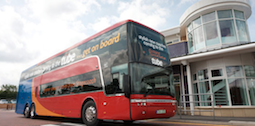Perth-based transport giant Stagecoach Group plc said on Wednesday its revenue fell 35% to £928.2 million in the year to May 1, 2021, as its operations were affected by Covid-19 lockdowns — and profit before tax slumped to £17 million from £90.9 million.
Stagecoach said it will resume dividend payments only when they are supported “by appropriate profit and cash flow generation, relative to our net debt and pension liabilities.”
However, in its outlook, Stagecoach said: “We have been encouraged by the progress made on the roadmap out of Covid-19 restrictions.
“We have increased regional bus vehicle mileage to around 94% of pre-Covid levels and also restarted our coach networks.
“It remains difficult to reliably predict the speed and extent of the recovery in the short-term, including the level of profit for the new financial year ending 30 April 2022.
“Nevertheless, we remain positive on the long-term outlook.
“The actions we have taken and the continuing support of government should ensure we continue to generate positive EBITDA and operating profit for the time being.
“We will look to re-build profitability closer to pre-Covid levels as the Covid-19 restrictions are eased.”
Stagecoach employs around 24,000 people and runs 8,300 buses, coaches and trams in England, Scotland and Wales.
On dividends, Stagecoach said: “Given the continuing uncertainties caused by the impact of Covid-19, we are not proposing any dividends in respect of the year ended 1 May 2021.
“We recognise the importance of dividends to many shareholders and, in line with previous guidance, it is our ambition to resume dividend payments in due course when supported by appropriate profit and cash flow generation, relative to our net debt and pension liabilities.”
Stagecoach CEO Martin Griffiths said: “While it is difficult to reliably forecast the pace of recovery from the Covid-19 pandemic, we continue to see good long-term prospects for the business.
“The new National Bus Strategy for England, and other recent commitments by the Scottish and Welsh Governments, provide a huge opportunity to fundamentally transform travel in our communities.
“There is significant potential to deliver healthier and more prosperous places by moving away from towns and cities built around cars to prioritising easy-to-use sustainable public transport and active travel.
“Our investment in new state-of-the-art bus scheduling software will help ensure we have efficient networks that can best meet future travel patterns.“
